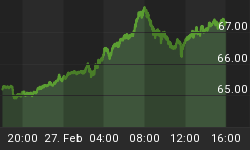Believe It or Not
For the longest time, those who contended that the gold market was rigged [the Gold Bugs] were looked upon with disdain - almost exclusively - by the mainstream media and mainstream financial outlets alike. The Gold Bugs' claims were widely dismissed as a chimera - concoctions by aggrieved speculators with active imaginations or too much time on their hands.
This widely held mainstream view was challenged recently when the brokerage arm of one of Europe's most venerable institutions - Cheuvreux, the brokerage arm of French banking giant Credit Agricole - published a 56 page research report that not only outlines, but then throws its substantial support behind the central thesis of the gold bug's "conspiracy against gold" theory - that prices have long been rigged by Western Central Banks.
It was convenient and easy for the collective mainstream to ignore the gold conspiracy arguments - so long as gold bugs were isolated, alienated or otherwise relegated to the fringes of economic thought. This conscious denial on the part of the mainstream is becoming a much trickier notion now that one of their respected members - Credit Agricole - is singing from the same hymn book.
This is clearly a conflict, as yet to be resolved.
Cutting Through The Fog
To accept the Gold Bug's assertions about the rigging of gold's price, brings with it at least tacit acknowledgement [because it's woven into the design of the fabric of the same argument] that inflation numbers - as reported by officialdom - are misreported through understatement. After all, it was the suppression of the gold price that was intended to make the "fudged" inflation numbers believable, no?
Acceptance of this assertion creates another disturbing dilemma - one that interestingly envelopes Alan Greenspan's infamous interest rate conundrum - that of what prudent or proper asset allocation is or should be. If inflation has been systematically under reported, then it follows that interest rates are erroneously low. Nobel Laureates have asserted that asset allocation models are built from a foundation of assumptions or truths,
For each asset class the user forecasts an expected return, a standard deviation, and a correlation to each of the other assets. Given these inputs, the software uses mean-variance optimization to build an efficient frontier. The frontier represents the efficient set of portfolios that can be created using the selected asset classes. Each portfolio on the frontier has the maximum expected return for a given amount of risk.
Inherent in this modeling - correlating assets - is the assumption that real interest rates are positive as evidenced by the efficient frontier always being plotted in the upper right quadrant. Under reporting of inflation has rendered this base assumption false [false data implies that the "efficient frontier" is a misnomer]. Empirical evidence in the real world supports this contention - in that large capital pools [pensionable assets of large companies like GM, Ford, IBM and the airlines] invested along traditional lines - steeped in fixed income securities - are proving to be woefully inadequate to fund current obligations.
This has created confusion that is begging for clarity.
Clear Vision From A Disciplined Mind
While deceptions, like those outlined above, abound - I've got to hand it to Mr. Llewellyn [Lew] H. Rockwell Jr. In a paper published just last week, What Economics Is Not, Rockwell - the reigning chief Austrian economic academic in North America - states,
And just as economic structures are best managed by property owners and traders, the entire society contains within itself the capacity for self-management. Any attempt to thwart its workings through the coercion of the state can only create distortions and reduce the wealth of all.
Rockwell's words, which mirror or embody the wisdom of Mises, go on to articulate,
Anyone familiar with current economics texts and journals knows that this is not the view that they promote. They are still stuck in an era where bureaucrats imagined themselves as smarter than the rest of us, where central bankers believed that they could end the business cycle and inflate just enough to cause growth but not ignite inflation, where antitrust experts knew just how big businesses should be.
Before anyone dismisses these words as "unimportant meanderings" by academics for academia, you'd be well served to consider,
The most common misunderstanding about economics is that it is only about money and commerce. The next step is easy: I care about more than money, and so should everyone, so let's leave economics to stock jobbers and money managers and otherwise dispense with its teachings. This is a fateful error, because, as Mises says, economics concerns everyone and everything. It is the very pith of civilization.
So there you have it folks, in three short, very succinct stanzas - in true Austrian form - Rockwell - consciously or not - has dissected, analyzed and laid bare the essence of the Greenspan Era as chairman of the Federal Reserve.
This is a mess which needs to be sorted out.
Time Is Of The Essence
The clock is ticking folks. Next month, the Federal Reserve is due to discontinue reporting M3 money supply [and related] statistics. They would have us believe that it's their intention to save us a few nickels. Many in the mainstream are as reluctant to see this ruse as they were to recognize gold rigging or corrupted inflation data.
Oil is also slated to begin trading for Petro-Euros next month too. Many pundits feel that this is a non issue as well. I beg to differ.
I view both of these near term events as "hair pin" corners on a treacherous road - both great candidates for an accident when piloting an un-roadworthy car. If you think not - perhaps you should first ask the folks at GM or Ford - then give it a second thought.















